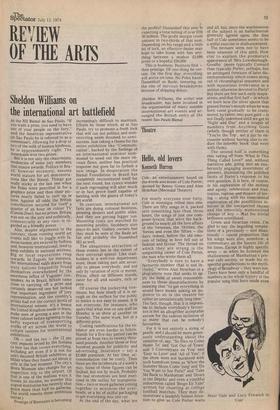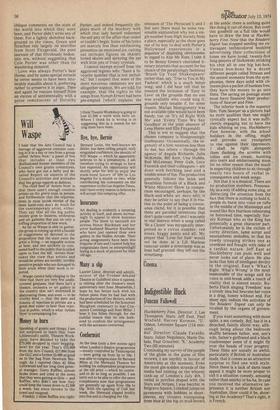Theatre
Hello, old lovers
'Kenneth Hurren
Cole: an entertainment based on the words and music of Cole Porter; devised by Benny Green and Alan Strachan (Mermaid Theatre) For nearly everyone over forty, Cole is nostalgia rolled into one. There are fifty songs in it, packed into something less than three hours, the songs of just one composer-lyricist that were the background to nearly all the love affairs of the 'twenties, the 'thirties, the 'forties and even the 'fifties — the days, indeed, before the old emotion of falling in love fell out of fashion and favour. The thread on which they are strung is the songwriting career of Cole Porter, the man who wrote them all.
"Everybody is sure to have a favourite number that is not included," writes Alan Strachan in a programme note that seeks to apply the balm of sweet reasonableness to these dissatisfactions by • insisting that "to get everything in would have meant asking an audience to sit in the theatre for rather an unrealistically long time." The fact, though, that it is impossible to include everybody's favourites is not an altogether acceptable excuse for the tedious inclusion of so many that can be nobody's favourites.
For it is not entirely a string of pearls; and I should be more generously, understanding about the 'omission of, say, "So Nice to Come Home To' and 'Get Out of Town' and 'I Concentrate on You' and 'Easy to Love' and 'All of You', if the. show were not burdened with such humdrum items as 'When the Summer Moon Come 'long' and 'Do You Want to See Paris?' and 'Take MO Back to Manhattan' and 'Down in the Depths' and even a youthful indiscretion called 'Bingo Eli Yale!' written for chanting at college football matches, They may demonstrate a laudably honest intention to give us Cole Porter warts and all, but, since the wartlessness of the subject is an hallucination generally agreed upon, the first half of Cole sometimes seems to be a wilful exercise in disillusionment.
The devisers seem not to have been unaware of this peril. How else to explain the premature appearance of 'Mrs LowsboroughGoodby' (more typically Coward than typically Porter, perhaps, but an astringent foretaste of later disenchantments), which comes along out of chronological sequence and with mysterious irrelevance in a section otherwise devoted to Paris? But there are few such early inspirations, and that first half — in which we learn how the silver spoon that graced Porter's mouth when he was born came gradually to be transmuted, by talent, into pure gold — is not finally redeemed until we get to 'Night and Day' and a couple of numbers from Anything Goes (which, though neither of them is "You're the Top', are a joy to encounter without having also to endure the imbecile 'book' that went with them).
The second half is something else, taking off from 'What Is This Thing Called Love?' and, without narrative ado, going into an exuberantly engaging assortment of answers, illuminating the polished facets of Porter's response to his own question. It is here, of course, in his exploration of the ecstasy and agony, celebration and frustration, raptutte and despair of loving — along with his coincidental exploration of the possibilities inherent in the unexpected rhyme and the smoothly manoeuvred change of key — ttiat his trivial brilliance scintillated.
Green and Strachan resist, I'm glad to say, the beguiling temptations of' a previously — and disastrously — voiced proposition that his songs were also, somehow, a commentary on the bizarre life of his times. Except in highly specific areas — as when he hymned the shallowness of Manhattan's prewax' café society, or made his respectful genuflections to the mythology of Broadway — they were not. There have been only a handful of numbers in the whole history of the popular song that have made even Oblique comments on the state of the world into which they were born, and Porter didn't write any of them. For a lightly sketched background to the times, Green and Strachan rely largely on snatches from Scott Fitzgerald, the poet laureate of that frivolously hedonistic era, without suggesting that Cole Porter was other than its wandering minstrel.
Love was always Porter's best theme, and by some special miracle he never seems to have been intolerably maudlin about it, preferring rather to preserve it in aspic. Time and again he rescues himself from an excess of sentimentality with a poise reminiscent of Dorothy Parker, and indeed frequently .displays much of the Mockery with which that lady herself redeemed the self-pity of the affair that ended or couldn't begin. Some of his lyrics are scarcely less than exhilarating pirouettes on emotional ice, cutting out intricate figures on sharply honed skates and spraying the ear with little jets of frosty crystals.
I cannot exempt myself from the aggrieved legions who "have a favourite number that is not included," but I suspect that some of the more notorious omissions are not altogether wanton. We are told, for example, that the rights to the songs from Nymph Errant had been pre-empted (which explains the omission of 'The Physician'); and I feel sure there must be some reasonable explanation why not a single number from High Society finds a place, especially as the show goes out of its way to deal with Porter's Hollywood experiences in a sequence of dispiriting obviousness. In regard to Kiss Me Kate, I take it to be Benny Green's cherished literary interests that account for his choice of the paralysingly facetious 'Brush Up Your Shakespeare' rather than, say, 'True to You in My Fashion' which is a much better song; and I did hear tell that he resisted the inclusion of 'Easy to Love' on the grounds that no one was available who could sing it, grounds only tenable if, for some reason, Marian Montgomery was not available (she would have been handy, too, on 'It's All Right With Me' and 'Every Time We Say Goodbye' in the joint absence of Lena Horne and Ella Fitzgerald).
This is not to suggest that the chosen company is bludgeoningly inadequate. Occasionally, the ingenuity of a lyric receives less than its due, but others — through the agency of Angela Richards, Julia McKenzie, Bill Kerr, Una Stubbs, Rod McLennan, Peter Gale, Lucy Fenwick and their colleagues — are done with fetching zest and a nimble sense of fun. The production generally follows the brisk and breathless formula of a Black and White Minstrel Show (a comparison encouraged, perhaps, by the black-and-white art deco set); it may be.unfair to say that it is routine to the point of being a continuous cliché, for it is possible that there are parodial intentions that don't quite come off, and I was only in real distress when a song called 'Be a Clown' was myopically interpreted as a circus number, red noses, baggy pants and all. My prayer that 'Love for Sale' would not be done in a Lili Marlene raincoat under a streetlamp was at least half granted: they left out the streetlamp.



































 Previous page
Previous page